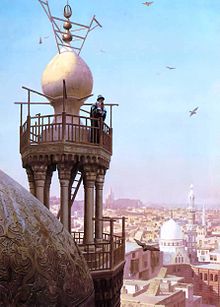Muezzin
![]()
This article or subsequent section is not sufficiently supported by evidence (e.g., anecdotal evidence). Information without sufficient evidence may be removed in the near future. Please help Wikipedia by researching the information and adding good supporting evidence.
The muezzin (Federal High German [muˈɛtsiːn], Austrian High German [ˈmu. ɛtsɪn]; Arabic مؤذّن mu'adhdhin, DMG muʾaḏḏin) is a crier who calls Muslims to prayer (Salat, Arabic: as-salāt). He calls the Muslim community to pray in the mosque five times a day at specific times. Only the call in the morning is at an unspecified time, namely when the sun rises. The Islamic call to prayer Adhan is sounded in Arabic.
The muezzin is not a clergyman, but belongs to the staff of the mosque. His function is - among other things because of the textual exclamation (or artistically decorated singing) - only conditionally comparable with the ringing of the church bell by the sacristan in Christianity. Depending on circumstances another believer can also take over the function of a muezzin, for example when prayers are performed during working hours.
The first person to assume the function of a muezzin was the Abyssinian Bilal al-Habashi, a freed slave and close confidant of the Prophet Mohammed. Often in the past a blind man was entrusted with this task, as he could not see from the minaret places where women were. The call was originally made from the minaret. In the meantime, the call is usually transmitted via loudspeakers from elsewhere.
However, the muezzin also calls when a person who lived in the immediate vicinity of the mosque has died.
In February 2017, a law "to prevent noise from public loudspeaker systems in houses of worship" was passed by the government in Israel. It is known as the Muezzin Law, which bans loudspeaker announcements at houses of worship from 11-07pm. This affects the muezzin's morning first call at sunrise. Supporters object to noise pollution and the alleged misuse of the loudspeakers for hate messages, while critics of the law see it as pure provocation. The Israeli member of parliament Ayman Odeh sees in the law "racist incitement against a national minority".

Muezzin (painting by Jean-Léon Gérôme, 1879)
Search within the encyclopedia